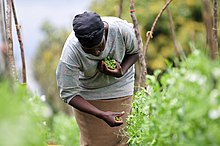Mudanças climáticas e género

Mudanças climáticas e género são uma forma de interpretar os impactos díspares das mudanças climáticas sobre homens e mulheres,[1] baseada na construção social dos papeis e relações de género.[2]
A mudança climática aumenta a desigualdade de género,[3] reduz a capacidade das mulheres de serem financeiramente independentes,[4] e tem um impacto geral negativo sobre os direitos sociais e políticos das mulheres, especialmente em economias fortemente baseadas na agricultura. Em muitos casos, a desigualdade de género significa que as mulheres são mais vulneráveis aos efeitos negativos das mudanças climáticas.[5] Isso deve-se aos papeis de género, especialmente no mundo em desenvolvimento, o que significa que as mulheres são frequentemente dependentes do ambiente natural para a sua subsistência e renda. Ao limitar ainda mais o acesso já restrito das mulheres a recursos físicos, sociais, políticos e fiscais, a mudança climática muitas vezes sobrecarrega mais as mulheres do que os homens e pode aumentar a desigualdade de género existente.[1][6][7][8]
Diferenças baseadas no género também foram identificadas em relação à consciencialização, causa e resposta às mudanças climáticas, e muitos países desenvolveram e implementaram estratégias e planos de acção para mudanças climáticas baseados no género. Por exemplo, o governo de Moçambique adoptou uma Estratégia e Plano de Acção para o Género, Ambiente e Alterações Climáticas no início de 2010, sendo o primeiro governo do mundo a fazê-lo.[9]
Referências
- ↑ a b Olsson, Lennart et al. "Livelihoods and Poverty." Arquivado em 2014-10-28 no Wayback Machine Climate Change 2014: Impacts, Adaptation, and Vulnerability. Part A: Global and Sectoral Aspects. Contribution of Working Group II to the Fifth Assessment Report of the Intergovernmental Panel on Climate Change. Ed. C. B. Field et al. Cambridge and New York: Cambridge University Press, 2014. 793–832. Web.(accessed October 22, 2014)
- ↑ CARE. "Adaptation, Gender, and Women's Empowerment." Arquivado em 2013-08-05 no Wayback Machine Care International Climate Change Brief. (2010). (accessed March 18, 2013).
- ↑ Eastin, Joshua (1 de julho de 2018). «Climate change and gender equality in developing states». World Development (em inglês). 107: 289–305. ISSN 0305-750X. doi:10.1016/j.worlddev.2018.02.021
- ↑ Goli, Imaneh; Omidi Najafabadi, Maryam; Lashgarara, Farhad (9 de março de 2020). «Where are We Standing and Where Should We Be Going? Gender and Climate Change Adaptation Behavior». Journal of Agricultural and Environmental Ethics (em inglês). 33: 187–218. ISSN 1573-322X. doi:10.1007/s10806-020-09822-3
- ↑ Habtezion, Senay (2013). Overview of linkages between gender and climate change. Gender and Climate Change. Asia and the Pacific. Policy Brief 1. (PDF). [S.l.]: United Nations Development Programme
- ↑ Aboud, Georgina. "Gender and Climate Change." (2011).
- ↑ Dankelman, Irene. "Climate change is not gender-neutral: realities on the ground." Public Hearing on "Women and Climate Change". (2011)
- ↑ Birkmann, Joern et al."Emergent Risks and Key Vulnerabilities." Arquivado em 2014-09-23 no Wayback Machine Climate Change 2014: Impacts, Adaptation, and Vulnerability. Part A: Global and Sectoral Aspects. Contribution of Working Group II to the Fifth Assessment Report of the Intergovernmental Panel on Climate Change. Ed. C. B. Field et al. Cambridge and New York: Cambridge University Press, 2014. 1039–1099. Web. (accessed October 25, 2014).
- ↑ Republic of Mozambique, Mozambique Climate Change Gender Action Plan (ccGAP) Report, accessed 25 December 2019
Bibliografia
- MacGregor, Sherilyn. "A Stranger Silence Still: The Need for Feminist Social Research on Climate Change." The Sociological Review 57 (2010): 124–140. Web. 25 Oct. 2014.
- Nussbaum, Martha C. Creating Capabilities: The Human Development Approach. Cambridge, MA: Harvard University Press, 2011.
- Olsson, Lennart et al. "Livelihoods and Poverty." Climate Change 2014: Impacts, Adaptation, and Vulnerability. Part A: Global and Sectoral Aspects. Contribution of Working Group II to the Fifth Assessment Report of the Intergovernmental Panel on Climate Change. Ed. C. B. Field et al. Cambridge and New York: Cambridge University Press, 2014. 793–832.
- Schneider, Stephen H., Armin Rosencranz, Michael D. Mastrandrea, and Kristin Kuntz-Duriseti. Climate Change Science and Policy. Washington, DC: Island Press, 2010.
- Tuana, Nancy. "Gendering Climate Knowledge for Justice: Catalyzing a New Research Agenda." Research, Action and Policy: Addressing the Gendered Impacts of Climate Change. Ed. Margaret Alston and Kerri Whittenbury. Dordrecht: Springer Netherlands, 2013. 17–31.











